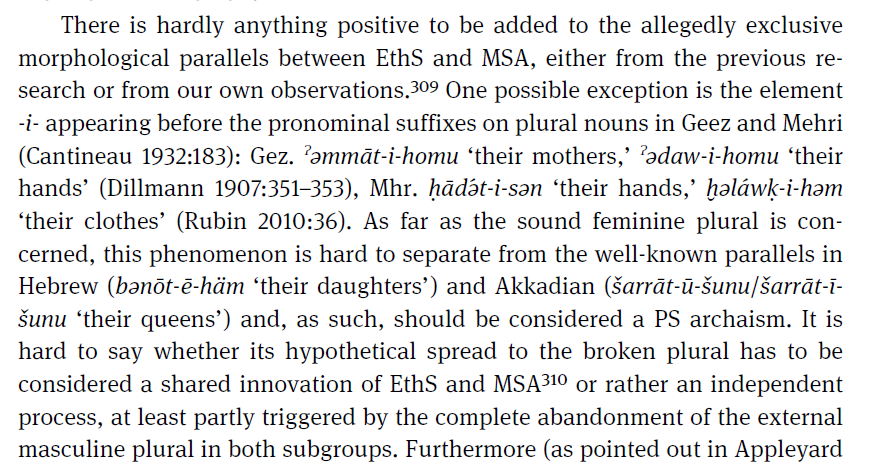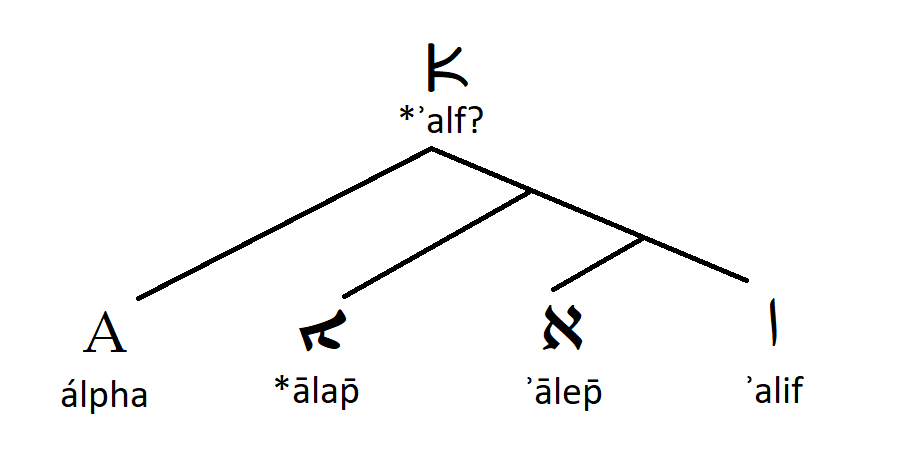
More of an article outline than a thread, but tweeting about an idea is more fun than looking up which 19th-century German already published it. So: a thread about the h in ʔĕlōhīm/allåhå/ʔilāh- etc. ‘god’, and why the #Hebrew word is morphologically plural. 1/20
Proto-#Semitic for ‘god’ can be reconstructed as *ʔil-, without *h. This is clear from #Akkadian il-, #Ugaritic i͗l, Hebrew ʔēl, maybe some others. Those last two are used both as common nouns and as names, uppercase-G ‘God’, ‘El’. 2/20
Meanwhile, there’s this other form, which reconstructs as *ʔilāh- (unchanged in Classical #Arabic). This is the basic word for ‘god, deity’ in Arabic and #Aramaic, e.g. Biblical Aramaic ʔĕlāh, #Syriac aloho/allåhå. 3/20
In Biblical Hebrew, this word is also used (both as a common noun and a name/title), but it looks plural: ʔĕlōh-īm with the masculine plural ending. Syntactically, though, it’s singular: b-rēšīṯ *bārā* ʔĕlōhīm ‘in the beginning, God *created (sg.)*’. 4/20
(A morphologically singular form ʔĕlōah also exists, almost only in poetry. It’s only really frequent in Job, where it could be an Aramaicism.) 5/20
ʔĕlōhīm can also be used with plural reference. It looks the same but takes plural agreement, as in ʔĕlōhīm ʔattem ‘ye are gods’ (Ps 82:6). You can also pluralize it in other languages, e.g. Biblical Aramaic ʔĕlāh-īn, Classical Arabic ʔālihat-. 6/20
That Arabic form is an example of a broken plural. These plurals have a different stem from the singular, with the same radical consonants inserted into a different vowel pattern. Textbook example: sg. malik- pl. mulūk- ‘king(s)’: pattern changes from CaCiC- to CuCūC-. 7/20
There are many different broken plural patterns. All of them need at least three radical consonants to be well-formed. One of the more common ones is CiCāC-, like Arabic raǧul- ‘man’, riǧāl- ‘men’. How would you form that from a stem with only two consonants, like *ʔil-? 8/20
One strategy for pluralizing words with two consonants is to add *h as a third radical. For something that isn’t quite a broken plural, we see this in sg. *ʔam-at-, pl. *ʔamah-āt- ‘slavegirl(s)’. 9/20
Another example is Syriac sg. šm-å, pl. šmåh-åṯå ‘name(s)’ (similar forms elsewhere in Aramaic). This could actually go back to *simāh-āt-, which looks like a CiCāC broken plural with a feminine plural ending added redundantly. 10/20
In the same way, *ʔilāh- could be a broken plural of *ʔil-. But then why does it mean ‘god’ and not plural ‘gods’? For starters, there’s a parallel in #Geez ʔamlāk ‘god’; the ʔaCCāC pattern is unambiguously plural, yet the word has a singular meaning. 11/20
If the Ge‘ez word is really a parallel and not somehow related, it could be that words for ‘god’ were likely to be formed as plurals out of respect (the “majestic plural”). But there’s another option: reanalysis. 12/20
In Classical Arabic, verbs that precede the subject are always in the singular. So while you’d distinguish ar-raǧulu yaqūlu ‘the man says’ from ar-riǧālu yaqūlūna ‘the men say’, it’s the same verb in both yaqūlu ar-raǧulu and yaqūlu ar-riǧālu. 13/20
This rule left traces in Biblical Hebrew and may be old (also because it’s hard to see how to innovate that). If so, a sentence like *li-yaðkur ʔilāhum would have been ambiguous between ‘may the gods remember’ and ‘may (the/a) god remember’. Easy to reanalyze *ʔilāh- as sg. 14/20
If a plural doesn’t have the masculine plural ending, many Semitic languages redundantly add it before possessive suffixes. I think Kogan (…w-degruyter-com.ezproxy.leidenuniv.nl/document/doi/1…: 109) is right to reconstruct this for Proto-Semitic, maybe also after broken plurals. 15/20 

If so, we would have a reconstructed paradigm like this. As a word that is morphologically a broken plural, *ʔilāh- is inflected as a singular in the absolute and construct state, but adds the masculine plural ending *-ū/ī- before suffixes. 16/20 

Hebrew levels the form with the masculine plural ending, creating the new absolute state ʔĕlōh-īm and construct state ʔĕlōh-ē. The old unsuffixed form *ʔilāh- > ʔĕlōah is preserved as an archaism. 17/20 

Aramaic and Arabic happen to be the two languages that get rid of the redundant linking vowels before suffixes: ‘your daughters’ is bnāṯ-ḵōn and banāt-u-kum, not **bnāṯ-ē-ḵōn or **banāt-ū-kum like e.g. Hebrew bnōṯ-ē-ḵem. This makes *ʔilāh- look completely singular. 18/20 

Aramaic ʔĕlāh-īn, Arabic ʔālihat-, and syntactically plural Hebrew ʔĕlōh-īm are then formally plurals-of-plurals: once *ʔilāh- had shifted from ‘gods’ to ‘god’, you have to pluralize that again to get ‘gods’. 19/20
So: if we assume that *ʔilāh- was originally the broken plural of *ʔil- but shifted in meaning to singular ‘god’, we can explain the *-āh-, the plural morphology in Hebrew, and how it became the unmarked singular in Aramaic and Arabic. 20/20
• • •
Missing some Tweet in this thread? You can try to
force a refresh







